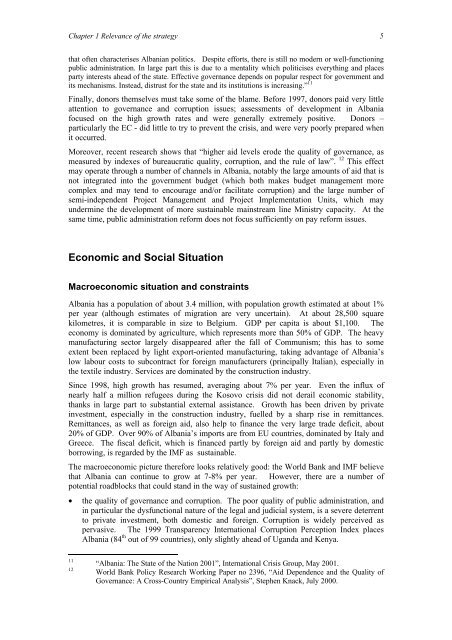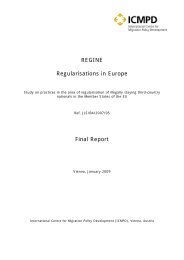Final Report - European Commission - Europa
Final Report - European Commission - Europa
Final Report - European Commission - Europa
You also want an ePaper? Increase the reach of your titles
YUMPU automatically turns print PDFs into web optimized ePapers that Google loves.
Chapter 1 Relevance of the strategy 5<br />
that often characterises Albanian politics. Despite efforts, there is still no modern or well-functioning<br />
public administration. In large part this is due to a mentality which politicises everything and places<br />
party interests ahead of the state. Effective governance depends on popular respect for government and<br />
its mechanisms. Instead, distrust for the state and its institutions is increasing.” 11<br />
<strong>Final</strong>ly, donors themselves must take some of the blame. Before 1997, donors paid very little<br />
attention to governance and corruption issues; assessments of development in Albania<br />
focused on the high growth rates and were generally extremely positive. Donors –<br />
particularly the EC - did little to try to prevent the crisis, and were very poorly prepared when<br />
it occurred.<br />
Moreover, recent research shows that “higher aid levels erode the quality of governance, as<br />
measured by indexes of bureaucratic quality, corruption, and the rule of law”. 12 This effect<br />
may operate through a number of channels in Albania, notably the large amounts of aid that is<br />
not integrated into the government budget (which both makes budget management more<br />
complex and may tend to encourage and/or facilitate corruption) and the large number of<br />
semi-independent Project Management and Project Implementation Units, which may<br />
undermine the development of more sustainable mainstream line Ministry capacity. At the<br />
same time, public administration reform does not focus sufficiently on pay reform issues.<br />
Economic and Social Situation<br />
Macroeconomic situation and constraints<br />
Albania has a population of about 3.4 million, with population growth estimated at about 1%<br />
per year (although estimates of migration are very uncertain). At about 28,500 square<br />
kilometres, it is comparable in size to Belgium. GDP per capita is about $1,100. The<br />
economy is dominated by agriculture, which represents more than 50% of GDP. The heavy<br />
manufacturing sector largely disappeared after the fall of Communism; this has to some<br />
extent been replaced by light export-oriented manufacturing, taking advantage of Albania’s<br />
low labour costs to subcontract for foreign manufacturers (principally Italian), especially in<br />
the textile industry. Services are dominated by the construction industry.<br />
Since 1998, high growth has resumed, averaging about 7% per year. Even the influx of<br />
nearly half a million refugees during the Kosovo crisis did not derail economic stability,<br />
thanks in large part to substantial external assistance. Growth has been driven by private<br />
investment, especially in the construction industry, fuelled by a sharp rise in remittances.<br />
Remittances, as well as foreign aid, also help to finance the very large trade deficit, about<br />
20% of GDP. Over 90% of Albania’s imports are from EU countries, dominated by Italy and<br />
Greece. The fiscal deficit, which is financed partly by foreign aid and partly by domestic<br />
borrowing, is regarded by the IMF as sustainable.<br />
The macroeconomic picture therefore looks relatively good: the World Bank and IMF believe<br />
that Albania can continue to grow at 7-8% per year. However, there are a number of<br />
potential roadblocks that could stand in the way of sustained growth:<br />
• the quality of governance and corruption. The poor quality of public administration, and<br />
in particular the dysfunctional nature of the legal and judicial system, is a severe deterrent<br />
to private investment, both domestic and foreign. Corruption is widely perceived as<br />
pervasive. The 1999 Transparency International Corruption Perception Index places<br />
Albania (84 th out of 99 countries), only slightly ahead of Uganda and Kenya.<br />
11<br />
12<br />
“Albania: The State of the Nation 2001”, International Crisis Group, May 2001.<br />
World Bank Policy Research Working Paper no 2396, “Aid Dependence and the Quality of<br />
Governance: A Cross-Country Empirical Analysis”, Stephen Knack, July 2000.
















